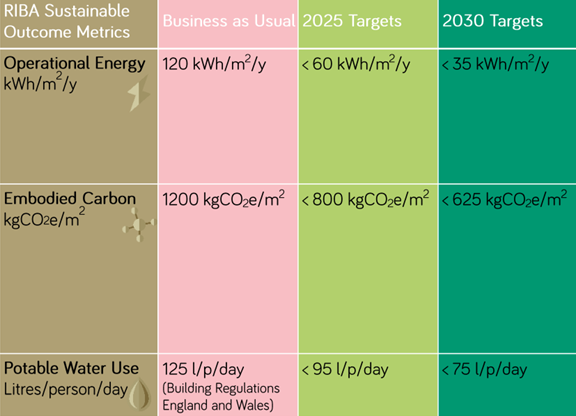BaNES have kicked off 2023 with a “groundbreaking” new policy which sets a precedent for low carbon planning policy across the country.
Housing in BaNES will now need to achieve net-zero energy in use; meaning all operational energy must be off-set using on site renewables, such as solar PV panels. In exceptional circumstances where this is not possible, BaNES will be operating a carbon credit scheme to offset excess energy by funding sustainable schemes throughout the region, such as installing solar PV on social housing.
Alongside this progressive operational policy, BaNES have also introduced an embodied carbon target of 900kgCO2/m2 for large developments.
Together these two policy changes should mean the whole life carbon of residential developments in BaNES will dramatically reduce in the coming years. However, to see the full picture, we need to compare these policies against other progressive industry guidance.
RIBA Climate Challenge 2030 for example sets the following targets for domestic developments:
This guidance suggests we should already be designing for <800 kgCO2/m2 with a 2030 target of <625 kgCO2/m2 embodied carbon, including services which are omitted from the BaNES requirements.
This may seem overly ambitious, but environmentally conscious housing developers are already surpassing these targets with standard forms of construction. We have recently undertaken an embodied carbon assessment for Goram Homes, Bristol City Council’s housing company, in partnership with Vistry Group. Houses at the One Lockleaze development in North Bristol were easily achieving <400 kgCO2/m2 with timber framed construction and <800 kgCO2/m2 with traditional construction for the apartments.
Publishing a target of 900 kgCO2/m2 embodied carbon (not including services) and net-zero operational carbon may inadvertently have a negative effect by encouraging developers to fill rooftops with solar PV to counteract poor thermal performance, rather than investing in fabric first design and integrating low carbon products to achieve buildings with a much lower whole life carbon.
Undoubtably, this is a massive step in the right direction for planning policy in England. Embodied carbon in particular has been screaming out for regulation, and by introducing the industry to concepts such as net-zero and whole life carbon we should see the acceleration of low carbon development we desperately need.
The gauntlet has now been thrown down to all other Local Authorities. I certainly hope Bristol and South Glos will look to match or surpass this policy when their new Local Plans go live in 2024.
gcp offer a whole range of sustainability assessments through gcp Consulting, including whole life carbon assessments. If you need to demonstrate compliance with sustainability targets or would be interested in understanding how well your current developments perform, please get in touch.

